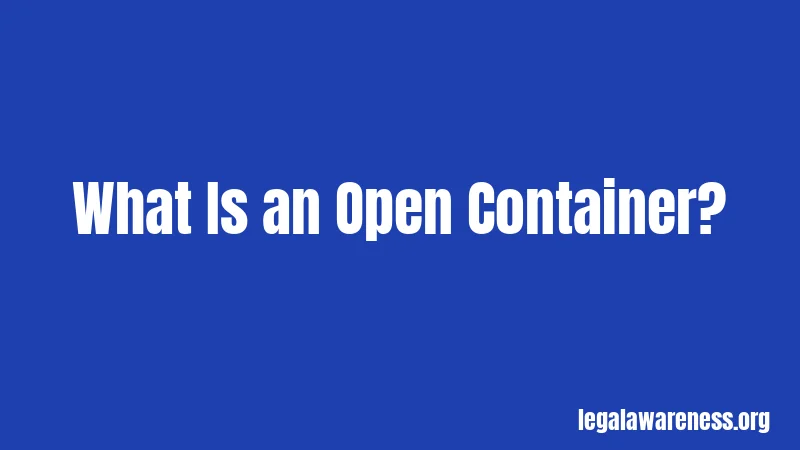Open Container Laws in Tennessee (2026): Everything You Need to Know Behind the Wheel
You’re driving down the highway. Your friend cracks open a cold one. Suddenly, you’re both breaking Tennessee law. Seriously. Open container laws in Tennessee are stricter than most people realize, and the penalties can catch you off guard. Let’s break down exactly what you need to know to stay on the right side of the law.
Most drivers don’t think much about where drinks go in their cars. But Tennessee has very specific rules about this. Knowing these rules could save you from hefty fines and legal headaches.
What Is an Open Container?

An open container is any alcoholic beverage that has been opened or is being consumed. It doesn’t matter if someone’s drinking it or just opened it. It doesn’t matter if it’s beer, wine, or liquor. If the seal is broken and it’s in reach, you’ve got an open container problem.
Think of it like this: a sealed bottle in your trunk is fine. A bottle that’s open anywhere in your vehicle is not. The law is pretty clear about that part, honestly.
Basic Open Container Laws in Tennessee
The Main Rule
Here’s the simple version: you cannot have an open container of alcohol in the passenger area of your vehicle. The passenger area includes the driver’s seat, front and back seats, and the area around them. Period.
Not sure what counts as “passenger area”? It basically means anywhere people sit or could reasonably reach. Your glove box and trunk don’t count, but your cup holder does.
Now, here’s where things get serious. Tennessee law takes this pretty seriously. You could face legal consequences even if you’re not the one drinking. Being the driver and having an open container in your car? That’s a violation. Having an open container as a passenger? Also a violation.
Who Can Be Charged
Wondering if this applies to you? Basically everyone in that vehicle could be at risk. The driver is responsible for having an open container. Passengers who possess open containers can also be charged. Both can face penalties.
“But I didn’t open it,” someone might say. Doesn’t matter. Having it in your possession is the violation.
Specific Examples That Matter
Let me break down some real scenarios. You’re at a tailgate before the game. Someone hands you a beer. You get in the car with it. That’s illegal. You’re moving to a new apartment with cases of beer in your back seat. Illegal. You finish a drink at a restaurant and keep the glass in your car. Also illegal.
A friend asked me about this recently. Most people think it’s fine if the drink is just sitting there. It’s not. You can be cited whether the container is being actively consumed or just sitting there.
Non-Alcoholic Exceptions
Here’s something that surprises people: juice containers aren’t a problem. Water bottles are fine. Coffee is definitely okay. The law specifically covers alcohol. That’s honestly the easiest part of this rule to remember.
Tennessee’s Specific Penalties

So what happens if you break this law? Let’s talk about the real consequences.
First Offense
For a first violation, you’re looking at a civil penalty. Tennessee treats open container violations seriously from the start. The fine can range from $50 to $150 for a first offense. That might not sound terrible, but it adds up fast if you factor in court costs.
You won’t get jail time for a first offense. That’s the good news. But you will get a fine on your record. You might also have to complete alcohol education classes. Some courts require this, some don’t.
Subsequent Offenses
Got cited before? The second time gets worse. Subsequent offenses carry higher fines. You’re looking at potentially $250 or more. Court costs pile on top of that. Some courts might require community service.
The really important part: if you keep getting cited, the penalties increase each time. This isn’t a “three strikes” situation where it resets. Each violation makes the next one more serious.
Jail Time Possibility
Okay, pause. Read this carefully. While Tennessee doesn’t typically imprison people for just having an open container, you could face jail time if this is combined with other violations. Driving under the influence? Open container? That’s a different story. You’d be facing DUI charges, which carry jail time.
Where You Can Legally Have Alcohol in Your Vehicle
This is where it gets interesting. There are actually legal ways to transport alcohol in Tennessee.
Your trunk is the safest place. Sealed bottles, cases, whatever. Put it back there and you’re fine. Your vehicle’s truck or cargo area counts. Even the hatchback area of an SUV works if it’s a separate cargo space.
Sealed containers in the passenger area are technically legal as long as they’re not open. The catch? If you’re pulled over, having sealed bottles in easy reach sometimes looks suspicious. Most cops understand the difference, but why take the chance? Your trunk is always the better choice.
Special Vehicles Have Different Rules
Mobile homes, RVs, and campers have different rules entirely. This is where it gets complicated. In an RV or motorhome, alcohol can be in the living area. It’s treated more like a home than a vehicle. But even then, there are restrictions. The person in the living area of a motorhome can’t be the driver.
Think of it like a houseboat rule. If you’re stopped, the person who was in the back living area can’t have been operating the vehicle.
Recent Changes and Updates

Tennessee’s open container law hasn’t changed dramatically in recent years, honestly. The statute has stayed pretty consistent. But enforcement has gotten stricter in some areas, particularly around college towns and areas with high DUI incidents.
Many people assume this is legal. They find out the hard way. Don’t be one of them. Stay updated on local enforcement trends where you live.
How to Stay Compliant and Avoid Fines
Stay with me here. This part is actually simple. Here’s exactly what you should do.
First, keep all open beverages in your cup holder or hand. Not on the floor. Not in your lap where it could spill if you’re pulled over. But wait, that’s not right. Let me correct that: you should never have open beverages in your car at all. Period. Not even in cup holders.
If you’re buying alcohol, put it directly in your trunk. Don’t open anything until you reach your destination. Seriously, that’s it. Most violations happen because people don’t follow this basic step.
At parties, tailgates, or events, finish your drink before you get in the vehicle. This sounds obvious, but you’d be surprised how many people don’t do it. Someone hands them something as they’re heading out. They think it’s fine to take it with them. It’s not.
If You’re Transporting Alcohol
Think of it like a system: sealed container, trunk, destination. That’s your safe route. Break any step, and you’re taking a risk.
Before your next road trip or party, make this a habit. It takes literally 10 seconds to move a bottle from a back seat to your trunk. Ten seconds could save you $150 or more and legal headaches.
What Happens If You Get Pulled Over
Let’s say the worst happens. A cop pulls you over and finds an open container. What actually occurs?
The officer will likely ask whose drink it is. Be honest about this. Lying makes everything worse. If it’s yours, be prepared for a citation. If it’s a passenger’s, the passenger gets cited instead of you.
You’ll get a ticket for open container violation. You have the right to contest it in court. Many people do. Sometimes the violation gets reduced or dismissed, depending on the circumstances.
Honestly, this is the part most people miss. You can fight the citation. You can ask for a court date. You can represent yourself or hire a lawyer. But most people just pay the fine without questioning it.
Your Legal Rights
You don’t have to answer every question a police officer asks. You do have the right to remain silent. You can ask if you’re free to go. You can ask if you’re being detained. These are your rights.
That said, being respectful and cooperative goes a long way. The officer is doing their job. You getting defensive doesn’t help your situation.
Special Circumstances and Exceptions
Not every situation is black and white. Let’s cover some edge cases.
Sealed vs. Open: The Gray Areas
What if the seal is loosened but not fully removed? Most courts would consider that opened. The law looks at whether the container could be easily used to drink from it. If yes, it’s probably considered open.
What about a bottle with a cork partially pulled out? Same situation. If it’s reasonably drinkable, it counts as open.
Businesses and Private Property
Here’s where it gets interesting. If you’re parked on private property that’s not a public road, some of these rules might not apply. But “might” is the operative word here. Don’t assume you’re safe on someone’s driveway just because you’re private property.
Public parking lots still count as public spaces. Your friend’s private driveway? That’s different. A shopping center parking lot? Still public.
Rideshare and Ride-Along Situations
If you’re using a rideshare service like Uber or Lyft, you’re a passenger. The driver is responsible for open container violations, not you. But that doesn’t mean you should open a beer in an Uber. The driver could get in trouble, and they can refuse service.
Personally, I think this is the part most people miss. You can get your driver rated down or banned for bringing alcohol into their car. Even if you’re technically not violating the law, you’re creating problems.
Frequently Asked Questions
Can I drink alcohol in my car if I’m parked? No. Even if your car is parked and turned off, you can’t have open containers in the passenger area. This applies whether you’re at a parking lot, someone’s driveway, or your own driveway.
What if the container was already open when I got in the car? You’re still responsible if you allow it to remain open in the passenger area. Move it to the trunk immediately, or don’t transport it at all.
Do passengers get in trouble for open containers too? Yes. Passengers can be cited for possessing open containers. Both the driver and passengers can face penalties.
Is it illegal to have alcohol in a cup? If the alcohol is in a regular cup or travel mug, it’s still an open container violation. The container type doesn’t matter. The fact that it’s open does.
What if someone opens a bottle without my permission? You’re the driver, so you’re responsible. You need to immediately tell them to stop. Ask them to put it away. If they refuse, pull over and contact police if necessary.
Does this apply to beer, wine, and liquor equally? Yes. Open container laws apply to any alcoholic beverage. Beer, wine, liquor, coolers, everything counts.
Can I keep alcohol sealed in my lap? Technically yes, if it’s sealed. But practically, don’t do this. Sealed bottles in cup holders or the trunk are your safest bet.
What about energy drinks with alcohol? If it contains alcohol, it’s covered by open container laws. Read the label. If it says it contains alcohol, treat it like beer or liquor.
Final Thoughts
Now you know the basics. Tennessee’s open container laws are straightforward once you understand them. Open containers in passenger areas are illegal. Fines range from $50 for first offenses up to more serious penalties for repeat violations. Your trunk is your safest storage spot.
Stay informed, stay safe, and when in doubt, ask yourself: would this look legal to a police officer? If the answer is no, put it in your trunk. Simple as that.
References
Tennessee Code Annotated Title 55, Chapter 10, Section 55-10-406 (Open Container Law)
Tennessee Department of Safety and Homeland Security – DUI Information
Tennessee Bar Association – Legal Help and Resources
National Highway Traffic Safety Administration – Open Container Laws Overview
Governors Highway Safety Association – State Traffic Safety Information
